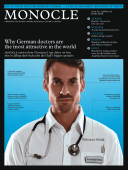
Issue 14
Why German doctors are the most attractive in the world. Monocle reports from Germany’s top clinics on how they’re filling their beds with the Gulf’s biggest spenders.
In This Issue
Oops! No content was found.
Looks like we no longer have content for the page you're on. Perhaps try a search?
Return Home

